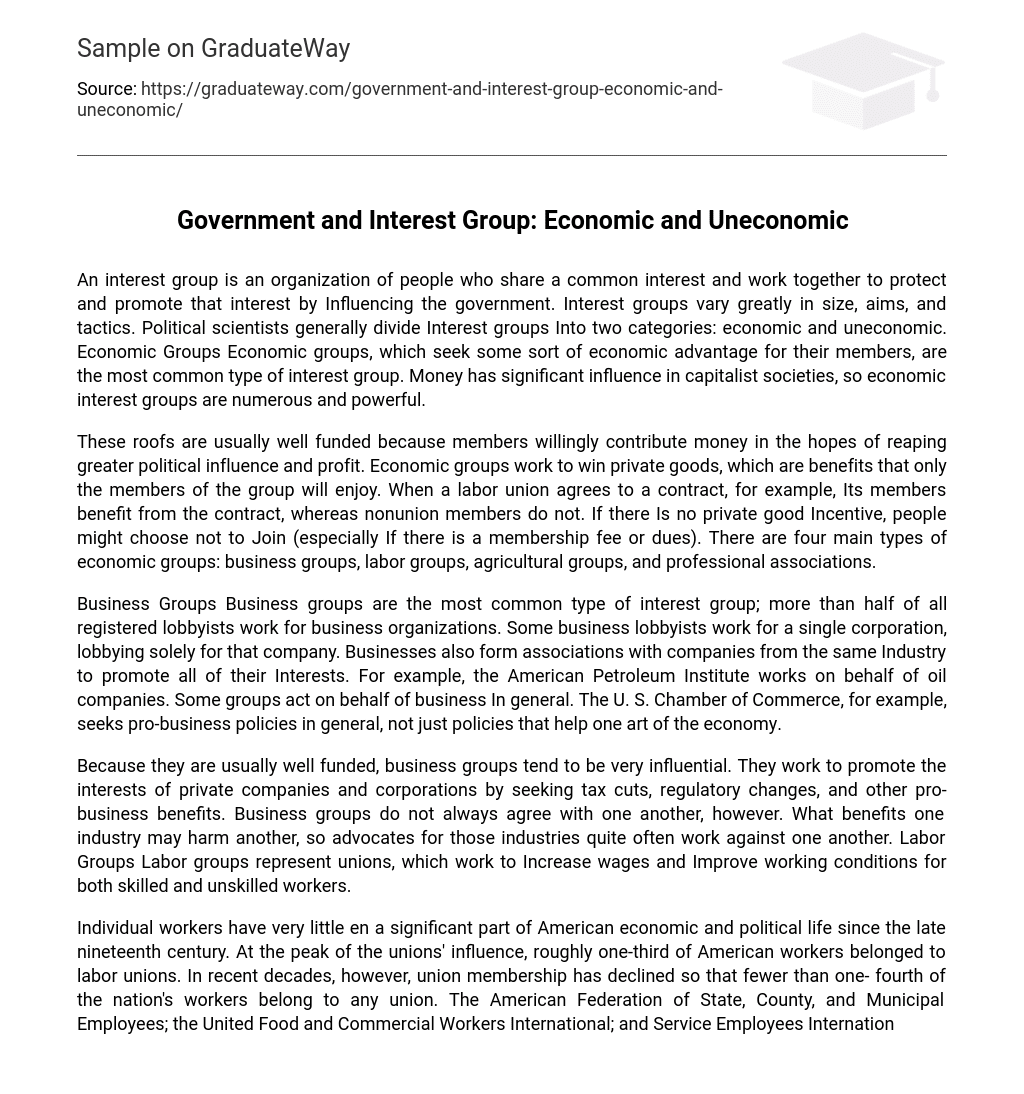An interest group is an organization of people who share a common interest and work together to protect and promote that interest by Influencing the government. Interest groups vary greatly in size, aims, and tactics. Political scientists generally divide Interest groups Into two categories: economic and uneconomic. Economic Groups Economic groups, which seek some sort of economic advantage for their members, are the most common type of interest group. Money has significant influence in capitalist societies, so economic interest groups are numerous and powerful.
These roofs are usually well funded because members willingly contribute money in the hopes of reaping greater political influence and profit. Economic groups work to win private goods, which are benefits that only the members of the group will enjoy. When a labor union agrees to a contract, for example, Its members benefit from the contract, whereas nonunion members do not. If there Is no private good Incentive, people might choose not to Join (especially If there is a membership fee or dues). There are four main types of economic groups: business groups, labor groups, agricultural groups, and professional associations.
Business Groups Business groups are the most common type of interest group; more than half of all registered lobbyists work for business organizations. Some business lobbyists work for a single corporation, lobbying solely for that company. Businesses also form associations with companies from the same Industry to promote all of their Interests. For example, the American Petroleum Institute works on behalf of oil companies. Some groups act on behalf of business In general. The U. S. Chamber of Commerce, for example, seeks pro-business policies in general, not just policies that help one art of the economy.
Because they are usually well funded, business groups tend to be very influential. They work to promote the interests of private companies and corporations by seeking tax cuts, regulatory changes, and other pro-business benefits. Business groups do not always agree with one another, however. What benefits one industry may harm another, so advocates for those industries quite often work against one another. Labor Groups Labor groups represent unions, which work to Increase wages and Improve working conditions for both skilled and unskilled workers.
Individual workers have very little en a significant part of American economic and political life since the late nineteenth century. At the peak of the unions’ influence, roughly one-third of American workers belonged to labor unions. In recent decades, however, union membership has declined so that fewer than one- fourth of the nation’s workers belong to any union. The American Federation of State, County, and Municipal Employees; the United Food and Commercial Workers International; and Service Employees International are among the largest and most influential labor unions.
The FALL-CIO (American Federation of Labor-congress of Industrial Organizations) is an umbrella organization of labor unions that cooperate in order to expand their influence. Labor unions spend much of their time and energy dealing with employers, but they also play a political role. Unions mobile v’deters and donate money to help candidates who they feel will benefit workers. Splits in the Labor Movement ere decline of labor unions has caused some people to question union leadership. In 2005, for example, a number of very prominent unions pulled out of the FALL-CIO because they could not agree on a political strategy.
Leadership elections have also urine nasty. Although organized labors political influence remains, some pundits argue that these disputes further diminish the power of unions. Agricultural Groups Agricultural groups represent the interests of farmers. Farmers have been organized for centuries to protect themselves against price fluctuations and other issues. In the United States, farmers’ groups, such as the Grange movement, have played an important role in politics, which continues today: The federal government spends large amounts of money supporting farmers and influencing what crops are grown.
Not all agricultural groups agree on the same policies. Some groups, such as the Farm Bureau, tend to work most closely with large agribusinesses, whereas others, such as the Farmers Union and the Grange, do more to protect family farms. Professional Associations Many professionals have formal organizations that set ground rules for the profession, regulate practices, and promote standards of conduct. Professional associations also lobby the government on issues related to their profession. The American Medical Association, for example, fights against laws it feels undercut Hessians’ autonomy.
Similarly, the National Education Association, a professional association for teachers, lobbies for policies it feels will benefit teachers and students. Prescription drugs are more important to health care than ever before. Interest groups have played a strong role in the rules governing prescription drugs, from Influencing the process of drug approval by the Food and Drug Administration to regulating the price and distribution of pharmaceuticals. When Congress added prescription drug coverage to Medicare in 2004, many felt that pharmaceutical companies had influenced Congress to forbid negotiations over drug prices.





